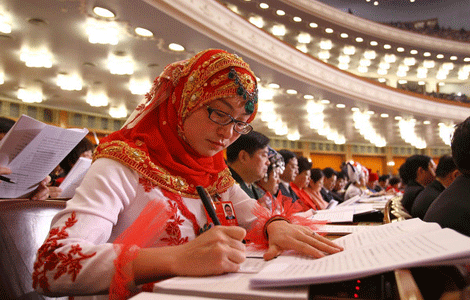 |
|
|
|
|||||||||
BEIJING - Transformation of the mode of development and economic restructuring are the most pressing tasks at present for the Chinese government, Premier Wen Jiabao said in a government work report Monday.
These measures are the "key to solving the problems of imbalanced, uncoordinated, and unsustainable development" in China, said Wen in the report delivered at the annual session of the National People's Congress, China's top legislature.
|
![China's Premier Wen Jiabao delivers government work report during the opening ceremony of the National People's Congress (NPC) at the Great Hall of the People in Beijing, March 5, 2012. [Photo/Xinhua] Economic restructuring most pressing task: Wen](../../images/attachement/jpg/site1/20120305/0013729e480910be82dd37.jpg) |
|
China's Premier Wen Jiabao delivers government work report during the opening ceremony of the National People's Congress (NPC) at the Great Hall of the People in Beijing, March 5, 2012. [Photo/Xinhua] |
"This is both a long-term task and our most pressing task at present," said the premier.
The Chinese government cuts the GDP growth target to 7.5 percent in 2012. This is the first time for the Chinese government to lower its economic growth target after keeping it around 8 percent for seven consecutive years.
One reason for setting a slightly lower GDP growth rate is to "guide people in all sectors to focus their work on accelerating the transformation of the pattern of economic development and making economic development more sustainable and efficient," Wen said.
After more than 30 years of development, the country has become the world's second largest economy and leading exporter.
However, over-reliance on exports, weak consumption and low-end manufacturing are becoming stumbling blocks on the nation's path to sustainable development.
In 2012, the government pledges to improve and upgrade the industrial structure, conserve energy, reduce emissions, and protect the ecological environment, Wen said.
The government will promote strategic emerging industries and the use of new energy sources, said Wen, while stressing that it will also put an end to blind expansion in industries such as solar energy and wind power.
In 2011, waning external demand due to the sluggish US and European economies, a steep rise in production costs and difficulty securing financing have combined to create problems for many Chinese companies.
"We will implement and improve policies to promote the growth of small and micro businesses, further reduce burdens on enterprises, and promote the vibrant growth of small and micro high-tech enterprises," Wen said.
The government will enhance balanced economic development among regions and "actively yet prudently" promote urbanization, according to the premier.
In China's urbanization drive, inequality in resource allocation discourages many migrant workers from settling in certain areas and cities.
"We will give higher priority to registering rural migrant workers with stable jobs and permanent homes in cities or towns as permanent urban residents in an orderly manner," Wen said.
Wu Ying, iPad, Jeremy Lin, Valentine's Day, Real Name, Whitney Houston, Syria,Iranian issue, Sanyan tourism, Giving birth in Hong Kong, Cadmium spill, housing policy

|

|

|

|

|

|